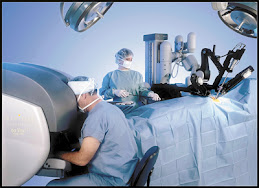In what is often called the age of biotechnology, robotic devices play their role by being increasingly chosen over traditional surgical techniques. Robotic surgery is showing the potential to be the bedrock of a new era in surgery. As disturbing as it may seem, it is no longer absurd to imagine an operating room of only --no misprint—robots, which are controlled by a single human surgeon (or technician should we say?) from outside the OR. Soon, we may live in a world where Dr. A arrives at his downtown LA clinic, goes over protocol, and performs cardiothoracic surgery on patient B in Bangladesh.
For those who cannot swallow our predictions, we should clarify a few things about robotic surgery. Robots should not be confused with androids. A robot is defined as a computerized system with a motorized construction (usually an arm) capable of interacting with the environment. C3PO and R2-D2 are androids. The Da Vinci surgical system is a robot. You will also learn from our blog that robots do not actually replace human surgeons but merely improve operations through small incisions. Minimally invasive surgery existed long before the first robot. Laparoscopic cholecystectomy and gall bladder excisions are two procedures guided by a viewing device, typically an endoscope, through a small incision. Robots merely take these, as well as other minimally invasive surgeries to the next level. What they bring to the table (no pun intended) are accurate sensors, improved sterility, faster post-surgical recovery, highly intelligent user interfaces, and high resolution live video of the site of operation.
Though some surgeons claim to have already mastered certain cardiothoracic procedures with robotic devices, we will see that certain disadvantages of robotic surgery are preventing them from replacing human surgeries at this point. The consensus from various doctors and sources seem to indicate that current robotic surgery is on par with, not better, not worse, than human surgery.
Read our blog and join our exploration of the last decade of robotic surgery. We will discuss areas of surgery that robots have already impacted and future outlooks for this rapidly increasing field in medicine.
Subscribe to:
Post Comments (Atom)

1 comment:
Dr. Anupam Goel is considered to be among the best Laparoscopic Surgeon in Chandigarh to provide advanced and painless surgery care. Having over 20 years of experience with minimally invasive procedures, he has already completed thousands of successful cases and he assists patients to heal fast and have minimum post-operative complications. Clinical excellence, personalised care, and honest advice are some of the reasons that make him a trusted physician in the Chandigarh tricity. Dr Goel is a trusted specialist because of his expertise in surgery.
Post a Comment